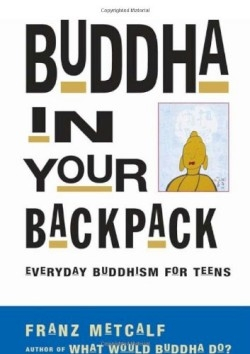Buddha In Your Backpack
Everyday Buddhism For Teens
The author steers dramatically clear of converting his teen readers to Buddhism, which is one aspect that makes this book enjoyable. He equates teens’ struggles with those of spiritual seekers, “all of which require awareness, insight, and patience.” In a tone that fosters a sense of camaraderie over any hint of preachiness, he incorporates Buddhist wisdom into the daily lives of teenagers, leaving plenty of room for them to specifically apply this wisdom to their own stories.
The book is divided into three sections, which are staggered with excerpts from traditional Buddhist texts. “Buddha and Buddhism” gives a historical summary of the Buddha’s life, introducing the Eightfold Path, Four Noble Truths, and five of the main precepts. These concepts are constantly referenced as points of consideration when discussing specific teen struggles.
Part Two, called “Everyday Buddhism,” puts a Buddhist slant on how to deal with the 10,000 joys and sorrows of such day-to-day themes as home life, school issues, teen bodies, and sexuality (One of the Buddhist precepts declares “I vow not to engage in harmful sex.”). Not only does Metcalf address the common misconception that Buddhism shuns any kind of desire, but he jumps right into the pool of teenage desire, discussing attraction, dating, sex, pregnancy, and love with a Buddhist awareness.
“Taking a Buddhist Path,” the third section of the book, presents such practices as meditation, chanting, and mindfulness exercises, and ends with small catalog of Buddhist literature and resources. The practices are general enough to appeal to all ages, but several are bent specifically towards teens, such as the practice of “mindful driving,” and an awareness exercise for teens who choose to use intoxicants. (Although Metcalf does not promote all the activities in the book, he includes them in his dialogue, allowing his readers to make their own informed decisions.)
Metcalf is a religious instructor and scholar at California State University. He received his PhD from the University of Chicago Divinity School with a dissertation on the question, “Why do Americans practice Zen Buddhism?” The author excels at laying a Buddhist framework over the experiences of contemporary teenagers in an easily comprehensible manner. Sometimes he tries too hard to appeal to the teenage psyche, by attempting a youthful dialect in his writing. This sort of “buddy lingo” may turn teen readers off completely, or it may resonate. This book holds worlds of potential for helping young people navigate their bumpy blossoming into the realm of adulthood.
Reviewed by
Kyle Norris
Disclosure: This article is not an endorsement, but a review. The publisher of this book provided free copies of the book to have their book reviewed by a professional reviewer. No fee was paid by the publisher for this review. Foreword Reviews only recommends books that we love. Foreword Magazine, Inc. is disclosing this in accordance with the Federal Trade Commission’s 16 CFR, Part 255.

